Headlines
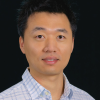 Sun's five-year grant will fund his innovative approach to advancing quantum information technology by developing high-dimensional quantum systems. These systems aim to enhance the scalability and functionality of future quantum networks, paving the way for a robust quantum internet capable of secure communication and transformative computational power.
Sun's five-year grant will fund his innovative approach to advancing quantum information technology by developing high-dimensional quantum systems. These systems aim to enhance the scalability and functionality of future quantum networks, paving the way for a robust quantum internet capable of secure communication and transformative computational power.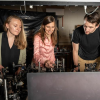 NSF has named CU Boulder a collaborator on newly announced pilot projects supported by the National Quantum Virtual Laboratory (NQVL) initiative. This groundbreaking effort seeks to accelerate the development of quantum technologies and make cutting-edge tools accessible to researchers nationwide.
NSF has named CU Boulder a collaborator on newly announced pilot projects supported by the National Quantum Virtual Laboratory (NQVL) initiative. This groundbreaking effort seeks to accelerate the development of quantum technologies and make cutting-edge tools accessible to researchers nationwide. CU Boulder has released a groundbreaking quantum workforce roadmap for Colorado and the Mountain West. The inclusive plan, funded by the Colorado Office of Economic Development and International Trade (OEDIT) and supported by key education, industry and government partners, outlines how we will train and inspire the next-generation quantum workforce.
CU Boulder has released a groundbreaking quantum workforce roadmap for Colorado and the Mountain West. The inclusive plan, funded by the Colorado Office of Economic Development and International Trade (OEDIT) and supported by key education, industry and government partners, outlines how we will train and inspire the next-generation quantum workforce.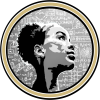 The three-day regional event, co-sponsored by the American Physical Society, focuses on talks, workshops and community building for undergraduate women and gender minorities in physics, including guidance on navigating graduate school and career paths, and mentorships.
The three-day regional event, co-sponsored by the American Physical Society, focuses on talks, workshops and community building for undergraduate women and gender minorities in physics, including guidance on navigating graduate school and career paths, and mentorships.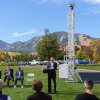 LongPath’s laser-based quantum devices scan oil and gas facilities in real time, searching for small quantities of methane, the main component of natural gas, leaking into the air. The new DOE loan will enable the tech to expand its current coverage area from 1,000 to over 20,000 square miles.
LongPath’s laser-based quantum devices scan oil and gas facilities in real time, searching for small quantities of methane, the main component of natural gas, leaking into the air. The new DOE loan will enable the tech to expand its current coverage area from 1,000 to over 20,000 square miles. JILA and NIST Fellow Jun Ye has been named the inaugural holder of the Monroe Endowed Professorship in Physics, the result of a $1 million endowment from CU alumnus Chris Monroe that underscores the university’s growing prominence in quantum information science and applied quantum physics.
JILA and NIST Fellow Jun Ye has been named the inaugural holder of the Monroe Endowed Professorship in Physics, the result of a $1 million endowment from CU alumnus Chris Monroe that underscores the university’s growing prominence in quantum information science and applied quantum physics.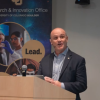 During the Oct. 14 talk, Vice Chancellor for Research & Innovation Massimo Ruzzene covered topics ranging from the past year’s performance to strategic investment in quantum facilities, partnerships and workforce initiatives that will propel the record-breaking enterprise into an even more impactful future.
During the Oct. 14 talk, Vice Chancellor for Research & Innovation Massimo Ruzzene covered topics ranging from the past year’s performance to strategic investment in quantum facilities, partnerships and workforce initiatives that will propel the record-breaking enterprise into an even more impactful future.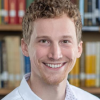 With a rich academic background spanning from Texas A&M to postdoctoral positions at MIT and Princeton's Institute for Advanced Study, Akers' current research focuses on quantum gravity and the holographic principle, making him a valuable addition to the university’s renowned quantum physics community.
With a rich academic background spanning from Texas A&M to postdoctoral positions at MIT and Princeton's Institute for Advanced Study, Akers' current research focuses on quantum gravity and the holographic principle, making him a valuable addition to the university’s renowned quantum physics community.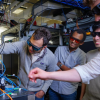 By generating quantum entanglement between groups of strontium atoms in their new atomic clock, a team of quantum physicists at CU Boulder and NIST led by Adam Kaufman have essentially squished four different kinds of clocks into the same time-keeping apparatus, a feat that could lead to new quantum technologies.
By generating quantum entanglement between groups of strontium atoms in their new atomic clock, a team of quantum physicists at CU Boulder and NIST led by Adam Kaufman have essentially squished four different kinds of clocks into the same time-keeping apparatus, a feat that could lead to new quantum technologies.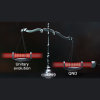 A recent study by Ana Maria Rey, James K. Thompson and their teams revealed that when measurement efficiency is greater than 19%, the quantum nondemolition (QND) measurement protocol outperformed unitary dynamical evolution—a finding with big implications for quantum metrology.
A recent study by Ana Maria Rey, James K. Thompson and their teams revealed that when measurement efficiency is greater than 19%, the quantum nondemolition (QND) measurement protocol outperformed unitary dynamical evolution—a finding with big implications for quantum metrology.

